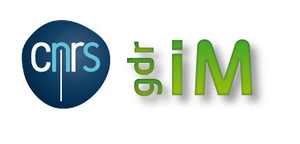|
8 videos available for this event!
|
VIRTUAL RESEARCH SCHOOL
French Computer Algebra Days
Journées nationales de calcul formel
1 – 5 March 2021
|
Scientific Committee
Comité scientifique Alin Bostan (INRIA Saclay) |
Organizing Committee
Comité d’organisation Magali Bardet (Université de Rouen Normandie) contact the organizers : jncf2021@groupes.renater.fr |
|
Computer Algebra refers to the study and design of algorithms for manipulating mathematical expressions and objects. It lies at the interface between Mathematics, Computer Science and various application fields. It covers a wide range of subjects, such as effective linear algebra, algorithmic number theory, integration and summation in closed form, differential and polynomial system solving, or special functions.
The French Computer Algebra community is internationally renowned for the excellence of its theoretical work. Several libraries produced by its members are part of mainstream software packages such as Maple or Sage. This success is notably due to the Journées nationales de calcul formel (JNCF), which are a remarkable opportunity for researchers to discuss recent and ongoing work with their peers. – New collaborations and interactions. The JNCF have traditionally been an opportunity to create successful collaborations between researchers from different parts of France. We now would like the JNCF to open to an international community, while remaining primarily French-speaking. The previous editions already included courses by colleagues from other European countries, and we intend to continue this trend. We also plan to better advertise the next JNCF in Mediterranean countries. |
Le calcul formel s’intéresse à la manipulation algorithmique d’expressions et d’objets mathématiques. C’est une discipline à l’interface des mathématiques, de l’informatique et de différents domaines d’application qui recouvre de nombreux sujets, de la théorie algorithmique des nombres à la résolution de systèmes différentiels en passant par les fonctions spéciales.
La communauté française de calcul formel est reconnue internationalement à la fois pour ses contributions théoriques et pour les logiciels qu’elle développe (dont plusieurs sont utilisés par des systèmes mondialement répandus tels que Maple ou Sage). Sa vitalité doit beaucoup aux Journées nationales de calcul formel (JNCF), qui représentent une opportunité remarquable pour les chercheurs d’échanger avec leurs pairs autour de travaux récents ou en cours. Les résultats que nous attendons sont en particulier : |
Paola Boito (University of Pisa, Italy) Algèbre linéaire structurée
Frédéric Chapoton (IRMA Strasbourg) Combinatoire Algébrique
Elisa Gorla (Université de Neuchâtel, Switzerland) Complexity of Groebner bases computations and applications to cryptography
Guillaume Moroz (Inria Nancy) Géométrie réelle effective et application en robotique
Contributed talks
Elena Berardini (LIX – École Polytechnique) Espaces de Riemann-Roch: calcul et applications
Jorge Garcia Fontan (Sorbonne Université) Singularities in the observation of four lines
Abhilash Nayak (Laboratoires des Sciences du Numérique de Nantes) Singularities in perspective-four-point problem
Vincent Neiger (Université de Limoges) et Clément Pernet (Université Grenoble Alpes) Deterministic computation
of the characteristic polynomial in the time of matrix multiplication
Sergey Yurkevich (University of Vienna) Computing the N-th term of a q-holonomic sequence
Ilaria Zappatore (INRIA Saclay-Île-de-France) Algorithm-based fault tolerant technique for Polynomial Linear System Solving by Evaluation Interpolation
Huu Phuoc Le (Sorbonne Université) Towards nearly optimal semi-algebraic formulas for the projection of real algebraic sets
Philippe Moustrou (The Arctic University of Norway) Exact semidefinite programming bounds for packing problems
Rémi Prebet (École Normale Supérieure Paris-Saclay) Towards faster roadmap algorithms for smooth and unbounded real algebraic sets
Alexandre Goyer (INRIA Saclay-Île-de-France) Symbolic-numeric factorization of linear differential operators
Jürgen Gerhard (University of Paderborn) What’s New in Maple 2021
Lorenzo Baldi (INRIA Sophia Antipolis) Geometry of Lasserre’s Truncated Moments
Rima Khouja (INRIA Sophia Antipolis) Simultaneous Matrix Diagonalization Problem
Trung-Hieu Vu (Sorbonne Université) Sum of squares decompositions of polynomials over their gradient ideals with rational coefficients
Jérémy Berthomieu (Sorbonne Université) Guessing Groebner bases of structured ideals of relations
Andrew Ferguson (Sorbonne Université) Groebner bases and critical values: The asymptotic combinatorics of determinantal systems
Thibaut Verron (University of Linz) Algorithme FGLM pour les algèbres de Tate
Pierre Briaud (ENS de Lyon) Algebraic attacks in rank-based cryptography
Amaury Durand (Université de Bordeaux) Duaux des codes de Reed-Solomon linéaires
Bastien Pacifico (Aix-Marseille Université) Multiplication in finite fields with Chudnovsky-type algorithms on the projective line







